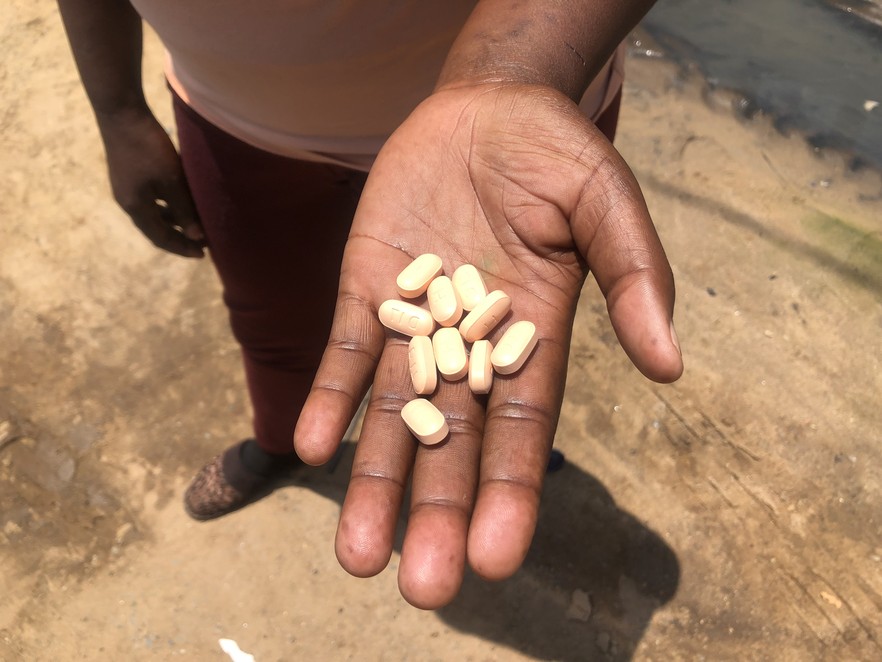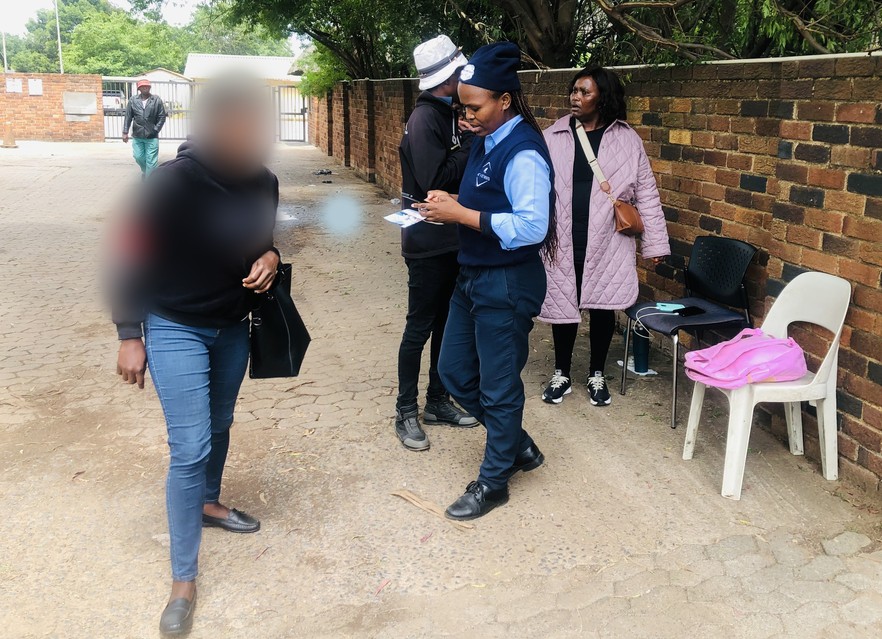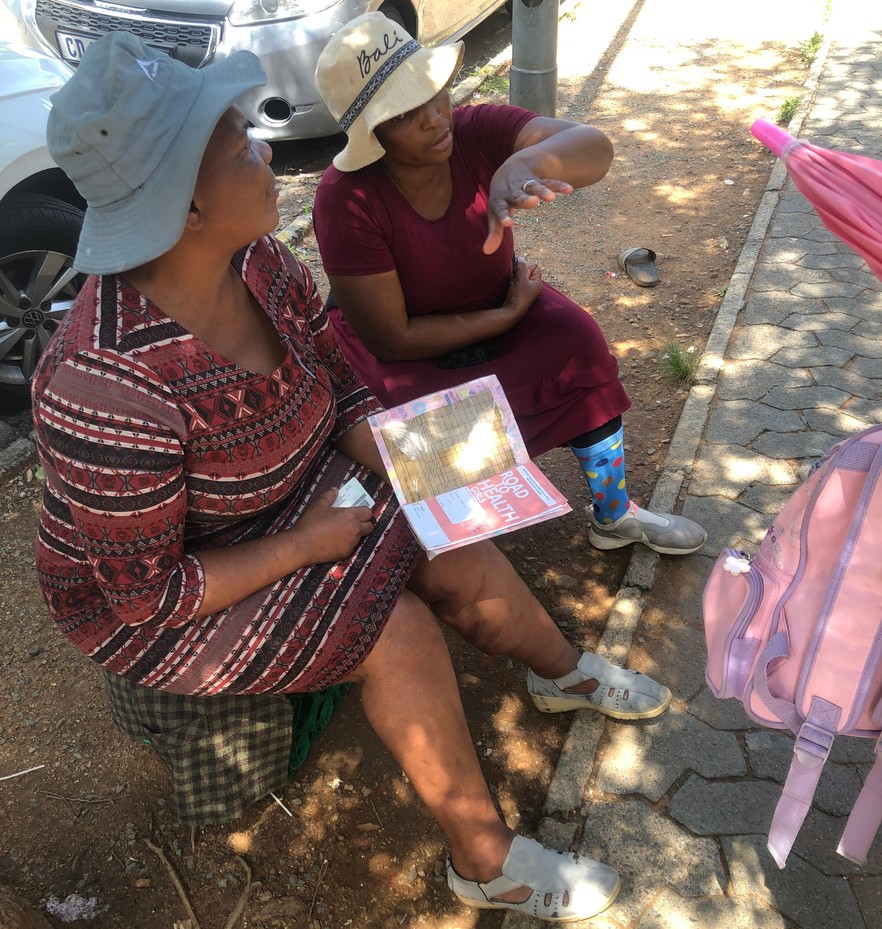Operation Dudula blocks access to clinics, violating court order
Witness testimony plus a visit by GroundUp to clinics confirms this. Clinic security guards are also blocking access to immigrants.
A woman with HIV holds the few antiretroviral pills she has left. She says she has been blocked from obtaining more medicines from the clinic she uses by members of Operation Dudula. The organisation’s leader appears to deny the allegation. Photos: Kimberly Mutandiro
- On 4 November the Gauteng High Court interdicted Operation Dudula from checking people’s IDs and stopping foreign nationals from accessing health care.
- We spoke to immigrants with HIV who accused Operation Dudula of continuing to block them from obtaining their medicines at Johannesburg clinics.
- We visited three clinics and witnessed immigrants being chased away by security guards in conjunction with non-clinic staff who witnesses identified as Dudula members.
- Operation Dudula’s leader answered our questions vaguely, saying that “ordinary citizens have joined the struggle outside our mandate”.
- The national health department has called on immigrants to report anyone who blocks their access to medicine, including health workers, to the police.
GroundUp spoke to immigrants who claim they have been blocked from accessing life-saving medicines at Johannesburg clinics. They accuse the anti-immigrant group Operation Dudula of blocking their access, sometimes in collaboration with clinic staff.
This is despite a court order preventing Operation Dudula from doing this.
To protect identities, we have used first names or pseudonyms.
Witness testimonies
Beauty, who has a 19-year-old daughter with HIV, says her daughter was chased away from Alberton Clinic by members of Operation Dudula. She claims Operation Dudula members checked IDs and her daughter was removed from the queue.
Beauty’s daughter was at the clinic to collect her antiretrovirals (ARVs). She says she will run out in two weeks.
Kudzai, who is 35, last received her ARVs and blood pressure pills from Spartan Clinic in Kempton Park in July. She had been attending the clinic since 2017 without any problems. When she went to the clinic last week, members of Operation Dudula turned her away before she could get her medicines, she says.
“I cannot die because some people are trying to gain attention through politics. I just want to live and take care of my children. If I die, who is going to take care of my kids?” said Kudzai.
She said the health department must urgently intervene to make sure no one is denied access to life-saving medication.
Chenai is nine. She has been taking ARVs since she was six. Her mother, Janet, claims Chenai was receiving her medicines from Charlotte Maxeke Hospital until Operation Dudula members started standing at the hospital three months ago, preventing immigrants from accessing care. Janet says she now has to buy ARVs from a pharmacy for herself and Chenai, and then only when she has money.
“When her medicine runs out, she goes for days without ARVs until I manage to get money. Operation Dudula members should have a heart because even children are suffering,” said Janet. Her and Chenai’s current stock of ARVs will soon run out.
Cathrine has been collecting ARVs from the Jeppe Street clinic. But for three months, she has struggled to access her medication because Operation Dudula has been blocking her, she says. She managed to buy ARVs from a pharmacy once. She sometimes skips doses so that her pills last longer.
“We should not be denied ARVs, because without them we will die,” said Cathrine.
We went to clinics to see for ourselves
I visited Spartan clinic and the clinic at the Kempton Park civic centre on Thursday. I visited Rosettenville and Alberton North clinics on Friday.
At the Spartan Clinic a woman in plain clothes sat next to a security guard at the clinic gate, checking IDs of every person who went into the clinic. Most people who went in had South African IDs. Later in the day, Kudzai went into the clinic, past both the woman and the security guard. Both the woman checking IDs and the security guard followed her and instructed her to get out. They told her only people with South African IDs were allowed to get inside the clinic. In a short while another security guard joined and they all started shouting for the woman to leave the clinic.
I approached the security guards and the woman who was checking IDs and identified myself as a reporter. I asked why they chased Kudzai away, when she desperately needs ARVs.
They answered that “a new rule” had been passed by the community that only South African citizens are allowed to attend the clinic and that all foreign nationals should be chased away, regardless of what their illness is.
A security guard checks Kudzai’s ID. Behind the security guard is another security guard and a woman who a clinic staff member said was with Operation Dudula.
When asked if clinic staff approved of the “new rule,” they said management inside the clinic would confirm the truth of what they had said. Up to three other people had also gathered at the gate.
One member of staff who had come out of the clinic revealed that the woman checking IDs and others standing at the gate were from Operation Dudula and that the clinic had been instructed not to treat foreigners. When we asked if the Department of Health approved of this, the woman said the matter was “political and beyond the clinic’s control”.
I asked if they were aware that some of the people being chased away were on ARVs. The staff member repeated that the clinic had been instructed by members of Operation Dudula to turn immigrants away.
The patient added that she and other foreign nationals were being chased away from the same clinic and one at the Kempton Park civic center daily. She said many people in desperate need of care were now afraid to approach the two clinics.
These two women were checking the IDs of patients attending the Rosettenville clinic.
At the Kempton Park civic centre clinic we found people already inside the clinic. Two car guards told us that Operation Dudula had already checked IDs early in the morning before the clinic opened.
At Rosettenville clinic on Friday two women sat outside the clinic checking IDs. A security guard standing behind the clinic gate said everyone had to pass through the women before going inside the clinic. The two women said only South African ID holders were allowed inside the clinic and not foreign nationals.
“All foreigners should either go to private doctors or go back and fix their countries. We no longer have enough medication in our clinic because of foreigners,” said one woman.
The two said immigrants were not allowed in the clinic with or without legal documents and regardless of what medication they were taking.
While the two women did not admit to being members of Operation Dudula, immigrant informal traders selling fruits and vegetables near the clinic said the women were members of Operation Dudula, wearing ordinary clothes (instead of the uniform that Dudula members wear).
Both women said the decision to chase foreign nationals from the clinic had been decided upon by the community.
At the Alberton North clinic in Johannesburg South, where Beauty’s daughter used to take her medication, two women in green reflective vests sat at the clinic entrance. They said all foreigners with different illnesses should go to the Unjani Clinic in Germiston for free treatment or to Dischem, Clicks, or private facilities if willing to pay. When asked where the decision comes from, they said it was a decision made by both the clinic and the community.
The women did not admit to being members of operation Dudula, but immigrants who spoke to us nearby said they were Operation Dudula members.
“We have been told that the clinic does not have enough medication to give foreigners. Some foreigners we referred to Unjani Clinic reported to us that they managed to get help there,” said one of the two women.
A web search indicated that Unjani Clinic charges a R300 fee.
Court order
Kopanang Africa Against Xenophobia, the South African Informal Traders Forum, the Inner City Federation, and Abahlali BaseMjondolo went to court to interdict Operation Dudula from denying access to health care to immigrants.
On 4 November the Gauteng High Court in Johannesburg ruled in their favour and stopped Operation Dudula from demanding ID documents from members of the public and from preventing foreign nationals from accessing health care. (See gray box below.)
Mike Ndlovu from KAAX says the organisation has since received numerous complaints of immigrants being harassed or turned away at clinics, mostly in Gauteng and KwaZulu-Natal and to a lesser extent from Limpopo and Mpumalanga.
“Our own monitoring and reports from partners like Doctors Without Borders (MSF) confirm it. MSF’s recent assessment found patients being turned away from more than half of the health facilities they visited in Gauteng,” said Ndlovu.
“The accounts are distressing: people living with HIV have gone for weeks without medication,” Ndlovu said, adding that the actions of Operation Dudula are in contempt of court. He called for the court ruling to be enforced.
We asked Operation Dudula
GroundUp put the witness testimonies to Zandile Dabula, leader of Operation Dudula, over WhatsApp before we visited the clinics. (Dabula is herself explicitly interdicted by the 4 November ruling.)
“May thy produce proof that those people are from Operation Dudula since you know even ordinary citizens have joined the struggle outside our mandate,” she responded.
We explicitly asked her if she denied Operation Dudula has been preventing immigrants from accessing health services since the court ruling. She did not answer.
The 4 November court order says that Operation Dudula has to communicate the order to their members. So we asked Dabula if and how this had been done. She did not answer.
After I visited the clinics, GroundUp sent questions to Dabula asking if she was aware that Dudula members were blocking access to clinics. She did not answer.
Department of Health Responds
National Department of Health spokesperson Foster Mohale said the department is not aware of Operation Dudula’s current actions.
“If it is happening, it means they are deliberately breaking the law and undermining the court ruling, which is a serious offence,” said Mohale.
He said the department needs evidence to prove that some clinic staffers are denying people without IDs access to healthcare, including ARVs, to take action against the implicated officials.
“Anyone who breaks the law must be reported to law enforcement agencies, including police,” he added.
Order of the Gauteng High Court
Here is an extract of the order by Judge Leicester Adams in the Gauteng High Court on 4 November. (Also see GroundUp’s report of the judgment and the judgment itself.)
1) It be and is hereby declared that only an immigration officer or a police officer has the power in terms of section 41 of the Immigration Act 13 of 2002 to demand that another private person produce her / his passport or other identity documents to demonstrate her / his right to be in the Republic of South Africa and that no private person has the power to do so
unless expressly so authorised by law.
(2) The first respondent, the eleventh and twelfth respondents be and are hereby interdicted and restrained from demanding that any private person produce her / his passport or other identity documents to demonstrate her / his right to be in the Republic.
(3) The first respondent, the eleventh and the twelfth respondents be and are hereby interdicted and restrained from: -
(a) Intimidating, harassing and/or assaulting any individuals that they identify as being foreign nationals;
(b) Making public statements that constitute hate speech on the grounds of nationality, social origin or ethnicity at public gatherings, on social media platforms or in any other way;
(c) Interfering with the access of foreign nationals to health care services and/or their right to such access;
(d) Interfering with access to, or the operations of, schools and intimidating or harassing learners, teachers or parents at schools;
(e) Unlawfully evicting foreign nationals from their homes;
(f) Unlawfully removing foreign nationals from their trading stalls or interfering with the employment of foreign nationals in shops and businesses;
(g) Instigating, encouraging or inciting any other person to perform any of the acts prohibited by this order, on social media, at gatherings in terms of the Regulation of Gatherings Act 205 of 1993, or in any other way;
(4) The first respondent be and is hereby ordered and directed to
communicate this order to any and/or all of its office-bearers and
members.
Support independent journalism
Donate using Payfast

Don't miss out on the latest news
We respect your privacy, and promise we won't spam you.
Next: Durban residents demand tap water and an end to water tankers
Previous: Lesotho to release hundreds of prisoners to reduce overcrowding
Letters
Dear Editor
I went to the clinic to collect my medication for high blood pressure and HIV. When I arrived, a Dudula woman at the gate chased me away and told me I could not enter. She is not a clinic employee and had no authority to stop me.
As a result, I was left without my chronic medication, and I started feeling very sick (dizzy and sore legs). This puts my life in danger.
I then went to the park police station to report the matter, but the two police women told me that as long as they did not beat me, there was no case. "You must report it to the CCMA, not here," they told me, and they refused to assist me.
I am extremely distressed and worried about my health and safety. Denying a patient essential health care is illegal and against South Africa's Constitution and the National Health Act.
© 2025 GroundUp. This article is licensed under a Creative Commons Attribution-NoDerivatives 4.0 International License.
You may republish this article, so long as you credit the authors and GroundUp, and do not change the text. Please include a link back to the original article.
We put an invisible pixel in the article so that we can count traffic to republishers. All analytics tools are solely on our servers. We do not give our logs to any third party. Logs are deleted after two weeks. We do not use any IP address identifying information except to count regional traffic. We are solely interested in counting hits, not tracking users. If you republish, please do not delete the invisible pixel.



